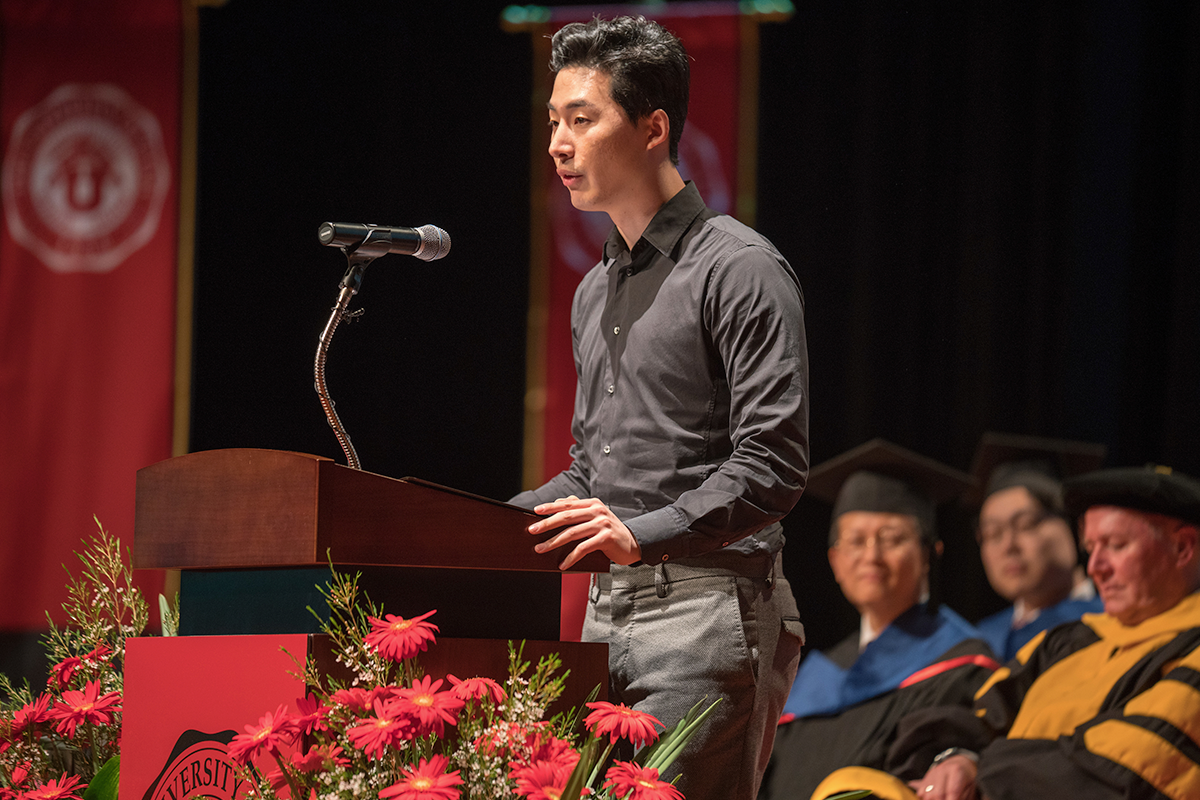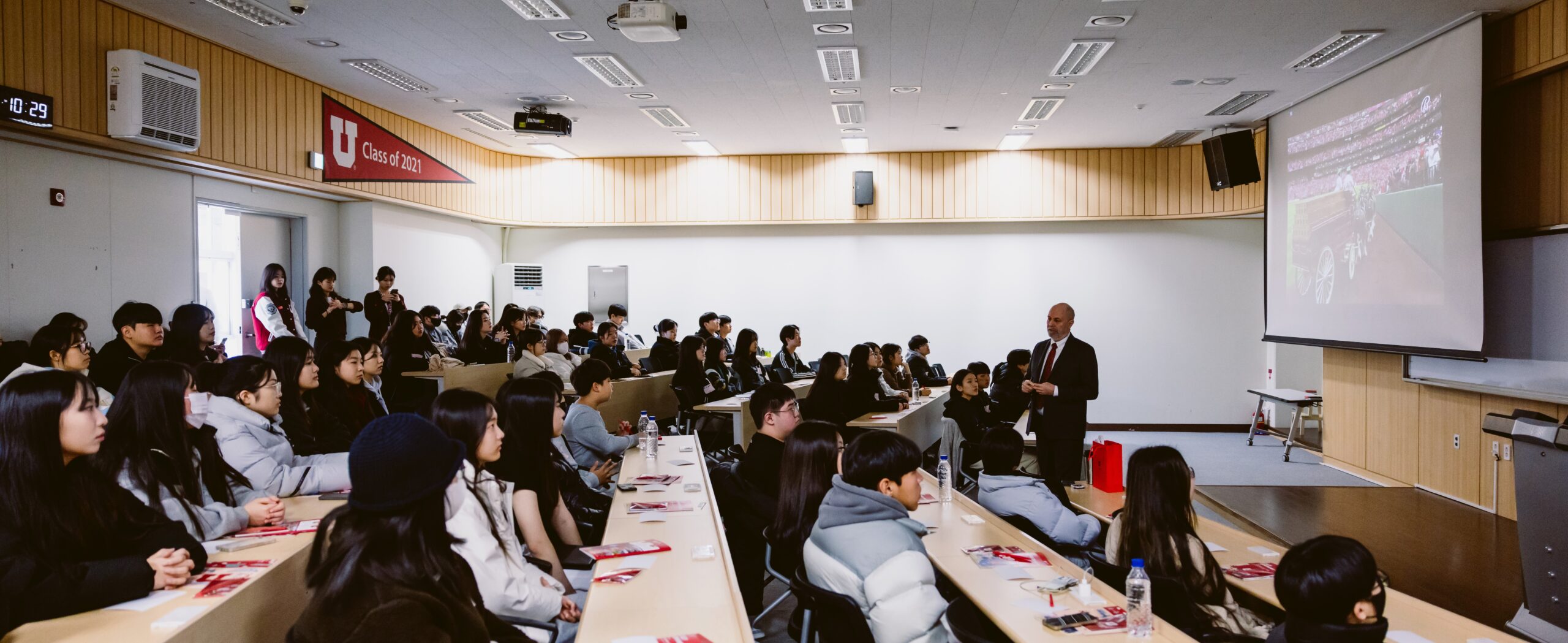The University of Utah is honored to have been invited to bring its record of academic excellence to the Republic of Korea with the opening of its new Asia Campus. The University of Utah offers the best possible academic experience. Your education is based on more than just the classes you take or the grades you receive. The programs and curriculum focus on critical thinking, group projects, peer feedback, and mentoring. No matter where you study, you will get the same premier University of Utah experience and the same internationally accredited degree!
Undergraduate Degree Programs
As an undergraduate student admitted to the Asia Campus you will be able to study in both the Asia Campus in S. Korea and the Salt Lake City Campus in the US. No matter where you study, you will get the same University of Utah experience!
Graduate Degree Programs
Graduate applicants to the University of Utah must hold a completed and officially conferred U.S. four-year Bachelor’s degree from a regionally accredited institution, or the institutionally-accepted international equivalent.
General Education
First-year students complete a set of foundational courses: A two-three semester sequence on introductory major courses; courses to develop academic writing skills; and also math and science. The second year is focused on coursework for the major. Students will typically spend two semesters, roughly around their third year of studies, at the University of Utah Salt Lake City campus. The fourth year integrates degree coursework with career readiness and preparation.
Lower-division requirements are usually taken toward the beginning of your time at the U. Students who transfer to the U from other institutions with an Associate’s Degree or more may have these requirements already met. Students should talk to the Academic Advisor if they think courses from another institution haven’t transferred and should.
Requirements:
- American Institutions (AI): take one course
- Writing (WR1&WR2): take one course each
- Quantitative Literacy (QL): take one QL course
- Intellectual Explorations Area Requirements: take one course in each of the disciplinary areas below except the one that you major in:
- Fine Arts Exploration (FF)
- Humanities Exploration (HF)
- Physical Exploration (PS)
- Life Science Exploration (LS)
- Social/Behavioral Science Exploration (BF)
Minors
As an undergraduate student admitted to the Asia Campus you will be able to study in both the Asia Campus in S. Korea and the Salt Lake City Campus in the US. No matter where you study, you will get the same University of Utah experience!
FAQ
A Bachelor of Science (B.S.) demonstrates proficiency in math and requires one Quantitative Intensive (QI) or Disciplinary Intensive (DI) course. A Bachelor of Arts (B.A.) demonstrates proficiency in a second language and requires fourth semester proficiency in a second language. Some majors allow you to choose to do either a B.A. or a B.S., while others do not offer you a choice.
Make an appointment with our advisors here: https://utahasia.mywconline.net/
Bring a course description and/or syllabus. We can evaluate the course based on the University's guidelines and determine if it fulfills the requirement.
UAC offers some courses that fulfill General Education requirements. It is highly recommended for students to take the courses sooner, as they will be able to focus on their major courses later on.
Students who complete their Writing (WR2) and Quantitative Reasoning (QA) requirements in their first 30 credits at the university tend to perform better in their subsequent courses and graduate sooner.
Your U of U cumulative GPA must be 2.0 or above for you to stay in good academic standing. You can view your GPA by logging on to CIS (and clicking 'Academic Summary').
The Academic Calendar provides important calendar dates for a specific semester. The Utah Asia Campus calendar can also be found at http://registrar.utah.edu/academic-calendars/index.php under Utah Asia Campus. The current year is listed at the top, and is followed by the next three academic years.
The academic year is the period during which the University operates and conducts its classes and programs. The academic year of the University of Utah begins in July and ends in the subsequent June. A catalog year is the year a student declares his/her major. The year starts in fall (e.g. The 2018 catalog year is Fall 2018 and Spring 2019). Students are responsible for completing the degree requirements that are listed for their catalog year. When running a Degree Dashboard report for a major, the student should always use the appropriate catalog year. The catalog year is listed
next to the declared major on the student profile section of CIS.
The catalog year is associated with the academic year that a student declares their major/minor. However, students can use any of the five active catalog years: the current academic year and the four previous years. A new catalog year begins every Fall and expires every Summer. Because requirements change from year to year it is important that students and advisors ensure that the correct catalog year is listed in the student’s record, on their degree audit, and on their application for graduation.
Complete WRTG 2010 with a grade of C-/CR or better.
This option is for students who graduated from high school in a non-English speaking country. All U of U students are required to take WRTG 2010 or an equivalent transfer class. To verify that you can use WRTG 2010 to fulfill your BA Language Requirement, or if you would like to ask if you can use WRTG 2010 to fulfill your BA Language Requirement even though you graduated from high school in an English speaking country, contact wlc-advising@utah.edu.
You are responsible for making sure that your BA Language Requirement is fulfilled on your Degree Audit before you apply for graduation. If you have fulfilled the BA Language Requirement but it does not show up as fulfilled on your Degree Audit, email wlc-advising@utah.edu.
Students may repeat any course they have previously taken at the University as long as it is still offered. However, students may earn credit hours for a given course for graduation only once unless the course has been designated as repeatable for credit. The last grade received is used to compute the student's grade point average (and grades from previous instances of the same course are not considered in computing the GPA, but are shown on the record for the term the course was taken). The grades of I, NC, W, V, or T may neither be removed by repeating the course, nor may they be used to replace a grade in a previous course that has been repeated. All repeated courses are identified as such on the student's academic record. Please consult with your major academic advisor click here.
An undergraduate student’s year level or class standing depends on the number of semester hours successfully completed, as follows:
Hours Completed:
0 to 29: First (Freshman)
30 to 59: Second (Sophomore)
60 to 89: Third (Junior)
90 - Graduation: Fourth (Senior)
Undergraduate Students:
12+ hours per term: Full Time
6-11 hours per term: Part Time
You may contact the Campus IT Help Desk
For the quickest response:
Submit an online “Report an Issue” ticket(login required) In the “How urgent is this issue” section, select “high(requires immediate attention)”
OR
Call the Campus IT Help Desk: 833-981-0049
Monday – Friday, 7:00 a.m. to 10:00 p.m. Mountain Time
(10:00 p.m. to 1:00 p.m. Korea Time)Saturday – Sunday, 8:00 a.m. to 6:00 p.m. Mountain Time
(11:00 p.m. to 9:00 a.m. Korea Time)
For less-urgent issues:
Email helpdesk@utah.edu
https://it.utah.edu/help/

















